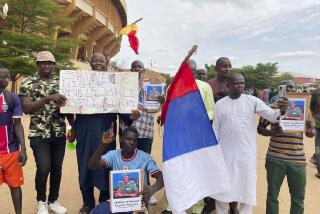Zaire’s Warring Sides Start Uneasy Talks in S. Africa
- Share via
PRETORIA, South Africa — Negotiators for Zaire’s warring factions sounded diplomatic Saturday at the start of their first face-to-face talks, throwing out terms like “peace” and “democracy.”
But the rebels, who control a third of the country and are still taking ground, seemed unwilling to compromise, and government negotiators stared stonily ahead when rebels said: “We want freedom, and we shall never negotiate that.”
Still, the government’s decision to talk with rebel representatives was seen as a step in the right direction, considering that the last time negotiators were in the same room--a week earlier in Togo--they wouldn’t even speak to one another.
Saturday’s meeting coincided with an agreement by rebel leaders to allow an airlift of sick and dying Rwandan refugees from eastern Zaire, where an estimated 120 refugees are dying every day.
The Office of the U.N. High Commissioner for Refugees has described some of the 100,000 refugees in the area south of Kisangani as “walking cadavers.”
Agency spokeswoman Pam O’Toole said in Geneva that it would probably take two days to organize the airlift, partly because the agency has to determine which refugees are the most needy but still able to be moved.
Meanwhile, in Kinshasa, Zaire’s capital, lawmakers and the new prime minister declared each other unconstitutional, causing further confusion in a political system that has been convulsed by the insurgency.
Prime Minister Etienne Tshisekedi--who dismissed the Parliament shortly after being installed in his post last week by President Mobutu Sese Seko--on Saturday said the Parliament was unconstitutional and named a new government.
Also Saturday, rebel leader Laurent Kabila denied reports that his forces had captured Mbuji-Mayi, the capital of Zaire’s diamond industry, but told French radio that they were nearby and also were closing in on the country’s second-largest city, Lubumbashi.
“Be there on Monday, that’s a good date,” he said when asked when Lubumbashi might fall.
More to Read
Sign up for Essential California
The most important California stories and recommendations in your inbox every morning.
You may occasionally receive promotional content from the Los Angeles Times.













